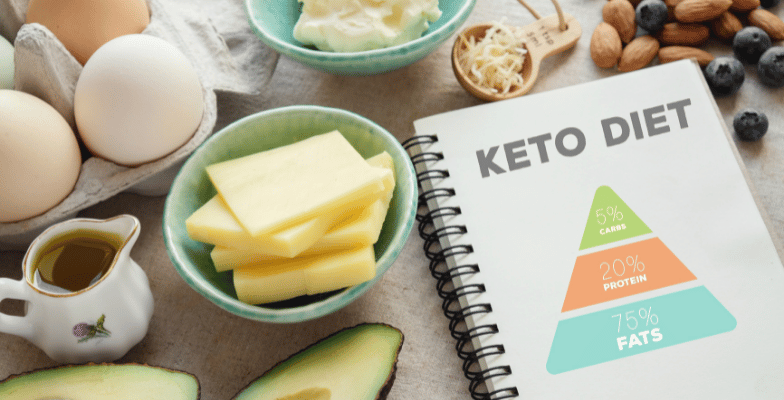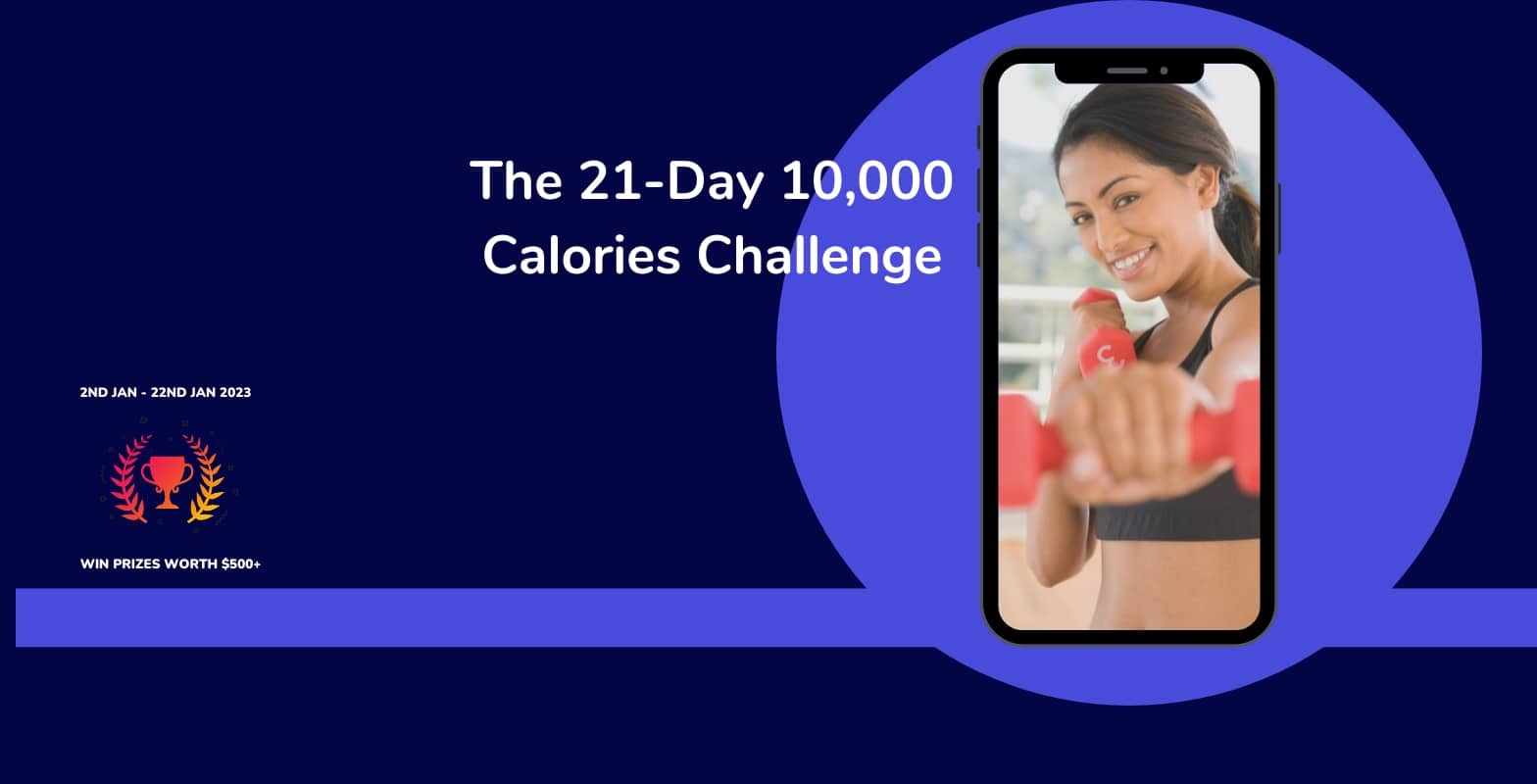What Is The Keto Diet? Benefits Of Keto Diet
- What Is The Keto Diet?
- How Does The Keto Diet Work?
- Benefits Of A Keto Diet
- What To Eat On A Keto Diet
- Keto Diet Side Effects
- Conclusion

Anyone trying to lose weight these days who is active on the internet has heard about the keto diet.
What Is The Keto Diet?
The keto diet is a nightmare for those who enjoy rotis, bread, pasta, rice and noodles, although it’s not as bad as it sounds.
A standard ketogenic diet is a diet with close to 70% of calories from fats, 20-25% from protein and less than 5% (somewhere between 20-50g/day) from carbohydrates. In simpler words, fats become the primary energy source or calories on a keto diet. Proteins keep their place as the secondary source, and carbohydrates are severely restricted.
For example, a single cup of cooked whole-wheat pasta has approximately 42 g of carbohydrates. That is almost the entire quota of carbohydrates for the day. For some, it is more than the total allowance.
How Does The Keto Diet Work?
Now that we know what the keto diet is let’s talk about how it works to clarify why it became such a popular diet for those looking to lose weight.
Glucose is not the only fuel source for the brain and our bodies. Besides glucose, the body can burn its fat stores for energy through the process of ketosis. Our genetics were formed millions of years ago and programmed to use both sources of energy.
Ketosis is the natural metabolic state of human beings. Without food for days, with no glucose or glycogen reserves left in the liver or muscle, the body breaks down body fat reserves in the liver.
The by-product of this fat metabolism produces energy molecules called ketones that can act as an alternative energy source for the brain and body. This leads to ketogenesis and eventually provides us with energy from fats rather than from glucose that comes from carbohydrates. 1https://pubmed.ncbi.nlm.nih.gov/29630231/
Benefits Of A Keto Diet
There must be some fantastic benefits for something to become as popular as the keto diet, right? Let’s find out what makes it so popular.
Rapid And Sustained Weight loss
A keto diet alters and optimizes the hormonal profile by lowering insulin levels, which triggers the mobilization of fat stores in the body. The result is a good measure of fat loss, as fat is utilized for energy.
There are many studies on the long-term effects of the keto diet. The results of these studies consistently show that among various groups of subjects, with one group on a low-fat, low-carbohydrate diet and the other on a high-fat diet, those who ate more fats lost much more fat mass than the other groups.
They also had decreased levels of triglycerides, LDL cholesterol and blood glucose and increased levels of HDL cholesterol. 2https://www.ncbi.nlm.nih.gov/pmc/articles/PMC2716748/, 3https://pubmed.ncbi.nlm.nih.gov/23651522/
Appetite Suppression
Losing weight with a crazy craving for sugar is a very tough job. Consuming food high in fats helps with that. Fats are slower to digest and hence remain in our system for longer. They do not flood the system with sudden bursts of glucose that dies down as suddenly as they began.
The time needed to digest fats gives us a chance to realize we are full and do not need to eat more, which often doesn’t happen when we eat a lot of carbs, including most bread, rice, pasta and other carbohydrate-rich foods.
When we manage to suppress hunger, we can control our caloric intake better, leading to a reduction in fat gain.
Increased Energy Levels And Mental Clarity
Metabolic changes happen when we go into ketosis, especially when it relates to the brain. Ketones, as we discussed, are an alternative fuel for the brain and body. When there is no glucose available, fatty acids break down into ketone bodies in the liver.
These ketones then act as an alternative fuel source for our energy-sucking brains. With an alternative fuel source, we don’t run out of energy quickly. The brain is 60% fat, and since fats are crucial in determining the brain’s ability to perform well, a brain fed enough healthy fats does not have mood swings. 4https://pubmed.ncbi.nlm.nih.gov/20329590/
May Help Reduce Symptoms Of Alzheimer’s Disease
Alzheimer’s disease is the most common cause of dementia, a general term for memory loss and other cognitive abilities severe enough to interfere with daily life. Alzheimer’s worsens over time.
In its early stages, memory loss is mild, but with late-stage Alzheimer’s, individuals lose the ability to carry on a conversation and respond to their environment. Alzheimer’s is the sixth leading cause of death in the United States.
Although there are very few studies on whether a ketogenic diet can reduce the symptoms of Alzheimer’s, the studies that have been done show promising results. 5https://pubmed.ncbi.nlm.nih.gov/19664276/, 6https://pubmed.ncbi.nlm.nih.gov/26766547/
May Help Reduce Epileptic Seizures
The journey of keto started in 1921 with Dr. Russell Wilder at the Mayo Clinic. Dr. Wilder created a low-carbohydrate diet for children suffering from epilepsy. And it worked! Approximately half of the children who ate a low-carb diet had half as many seizures, and 15% became seizure-free. 7https://www.ncbi.nlm.nih.gov/pubmed/23515147
May Help Improve Symptoms Of Type-2 Diabetes
A person with type-2 diabetes suffers from insulin resistance. A primary feature of insulin resistance is an impaired ability of muscle cells to take up circulating glucose. A person with insulin resistance will divert a more significant proportion of dietary carbohydrates to the liver, where much of it is converted to fat, as opposed to being oxidized for energy in skeletal muscle.
A 16-week 2005 study published in Nutrition & Metabolism concluded that a low-carbohydrate, ketogenic diet (LCKD) may improve glycemia and reduce the need for medications in patients with type 2 diabetes. 8https://www.ncbi.nlm.nih.gov/pmc/articles/PMC1325029/
May Improve Heart Health
A ketogenic diet is also known to balance cholesterol levels, blood pressure, and triglycerides. Various studies suggest that optimizing different types of fats in the diet can positively affect issues caused by refined carbs in today’s general dietary practices. 9https://pubmed.ncbi.nlm.nih.gov/16424116/, 10https://onlinelibrary.wiley.com/doi/full/10.1111/j.1467-789X.2008.00518.x, 11https://pubmed.ncbi.nlm.nih.gov/12088525/
What To Eat On A Keto Diet
With so many benefits offered and studies to back them up, one wonders what to eat and not eat when following a keto diet.
When on the keto diet, completely avoid refined flour as pasta, noodles, or white bread. Avoid refined sugar, packaged fruit juices with fructose, cakes, pastries and even brown rice, beans, lentils, tubers, yams, whole grain bread and unhealthy trans fats from deep-fried foods.
Eat good amounts of vegetables and fruits like avocado, broccoli, and others, but be sure they rank low on the glycemic index. Also, eat poultry, meat, fish, eggs, butter, cream, nuts, and seeds.
You can consume anything naturally sourced that has fat in it. However, remember your TDEE or Total Daily Energy Expenditure. Eating excessive calories can still lead to weight gain and all kinds of health issues that come with obesity.
Related Article: Calories In Calories Out: CICO | Does It Matter?
Keto Diet Side Effects
There aren’t many side effects of the keto diet in the long term unless you fail to plan it smartly. However, when you begin a keto diet, you may suffer from a condition called the keto flu.
Most of us are so used to eating carbs as the largest contributor to our daily diet that changing our primary energy source causes symptoms, including:
-Headache
-Brain fog
-Dizziness
-Nausea
-Carb cravings (obviously)
-Irritability
-Muscle cramps
-Constipation
-Diarrhea
-General weakness
-Lack of focus
-Difficulty sleeping
However, if you optimize your water intake, sleep properly and include all healthy fats, the keto flu may pass sooner than you expect.
Conclusion
A keto diet is a fantastic way to lose fat and tap into a huge energy source, as fats have more calories per gram than other macronutrients. It also helps stabilize hormones, cholesterol and blood pressure levels but is very hard for vegetarians, especially Indian vegetarians.
Since there are restrictions on almost all the usual sources of carbs, including legumes, it’s very hard for a vegetarian to get enough protein on a keto diet.
As with everything else, it’s best to be careful when starting something new and plan ahead before embarking on the journey. Also, if you have any medical conditions, consult your physician before beginning a new diet.
Let me know what you think about this, or ask any questions in the comments below!

Skill-Based Education.
Global Recognition.
Powerful Community Building
Secure a certificate of completion in as little as a day by graduating from one of our free courses.
Get Access to Our Free Courses. No Credit Card Required.

Fabulous Body Membership
Your All-Access Pass to A Fabulous Body & A Rewarding Career
25+ Certificate Courses & Programs, All Included
15 Day Free Trial, 100% Money-Back Guarantee
About Kunal Arora
Kunal is someone who faced all sorts of health issues between 2015 and 2018. In his own words, he emerged victorious over his conditions after graduating from multiple courses from Fabulous Body in the field of nutrition, diet planning and fitness. He went on to help many people as a solopreneur as a nutrition & fitness expert and is very compassionate and empathetic with people, having gone through a tough time of poor health himself. Today he is a part of Fabulous Body and helps change lives as a part of the core team.










